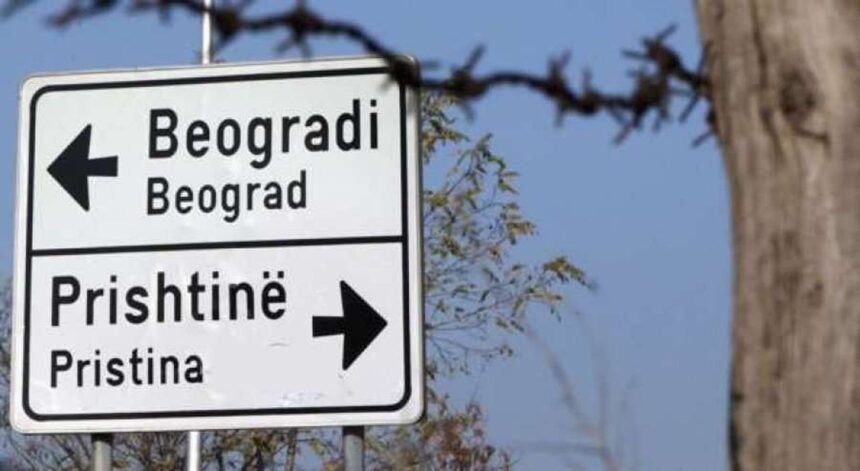Despite warnings from European leaders that the Kosovo–Serbia dialogue must soon resume, expectations for a major breakthrough remain low. Analysts point to a lack of political will, unfulfilled agreements, and internal EU uncertainties as reasons why the process continues to stagnate.
The resumption of the dialogue, even after calls from EU leaders during the European Political Community Summit, is unlikely to yield significant progress, according to political observers.
KOHË’s Brussels correspondent, Augustin Palokaj, highlighted several unresolved issues the EU must clarify before restarting the process.
“Dialogue may resume, but it’s unlikely to bring any breakthroughs since both sides have long stalled on implementing their obligations. Before restarting, the EU must first clarify for itself whether the agreement said to have been reached in Brussels and later its annex in Ohrid is still valid. Serbia has repeatedly said, even in writing, that it does not intend to fully implement the agreement. Meanwhile, Kosovo currently lacks a functional Assembly, let alone a new government capable of taking responsibility for a meaningful dialogue,” Palokaj said.
French President Emmanuel Macron, speaking from Tirana at a joint press conference with Albanian Prime Minister Edi Rama, called for renewed dialogue between Kosovo and Serbia in the coming weeks.
He was asked about President Vjosa Osmani’s criticism that the EU has been unbalanced in its treatment of the parties and penalizes the one upholding constitutional order.
Macron stressed that too much time has passed without progress and that the EU is right to demand concrete steps forward in the political process.
“I don’t believe these demands reflect a loss of credibility. We must move past the deadlock that is blocking the situation. I hope that in the coming weeks we can resume dialogue with both Pristina and Belgrade, since both countries have faced socio-political challenges. These demands are legitimate and should not allow the process to drift into indirect or sideline negotiations, which are not a proper way to move forward,” Macron said. He also emphasized the need for political will in advancing the talks.
“It’s never a good idea to divide the process or call it into question,” he added.
The latest Kosovo–Serbia agreement was supported by Macron and based on the so-called Franco-German plan. However, Serbia has refused to sign the document, and no implementation has followed.
The EU’s new High Representative for Foreign Affairs and Security Policy, Kaja Kallas, expressed optimism about potential results in the dialogue when speaking to reporters.
Kosovo’s President Vjosa Osmani, who represented the country at the summit, held a bilateral meeting in Tirana with Kallas. She stated that she will be abroad next week, when Kallas is scheduled to visit Kosovo. Osmani reiterated that the EU must lift its punitive measures on Kosovo before any meaningful dialogue can resume, a concern she also raised at the EU leaders’ dinner.
Palokaj suggested that meetings may continue, but not at a high level.
“Besides visits and dialogue appeals, perhaps a few occasional meetings between chief negotiators, I don’t see any real potential for major shifts unless the situations in Serbia and Kosovo are clarified. But the EU must make efforts—if for nothing else, at least to justify the positions it has created within its structures that are tasked with managing this dialogue,” he noted.
The dialogue issue was also addressed on Saturday by Bodo Weber, senior associate of the Democratization Policy Council in Berlin. In an interview with Radio Free Europe, he emphasized that the new German government must make a strategic shift in the Kosovo–Serbia dialogue.
“The question is whether the new German government will insist on these unfulfilled agreements, or whether it will have the courage to push for a deep restart of the dialogue—toward a comprehensive and final agreement. That would require a strategic change in the EU’s policy toward Serbia, no longer treating Vučić’s regime as a values-based partner. It remains to be seen whether the CDU and Merz have the strength for this. Otherwise, the dialogue will further deepen into crisis, and the EU will lose more credibility as a democratic actor in both Kosovo and Serbia,” Weber said.
The Kosovo–Serbia dialogue began in 2011, but despite numerous agreements, implementation has been lacking. Serbia has refused to follow key provisions of the most recent agreements, including those requiring it not to block Kosovo’s membership in international organizations. Belgrade has continuously lobbied against recognition and Kosovo’s inclusion in global mechanisms.







